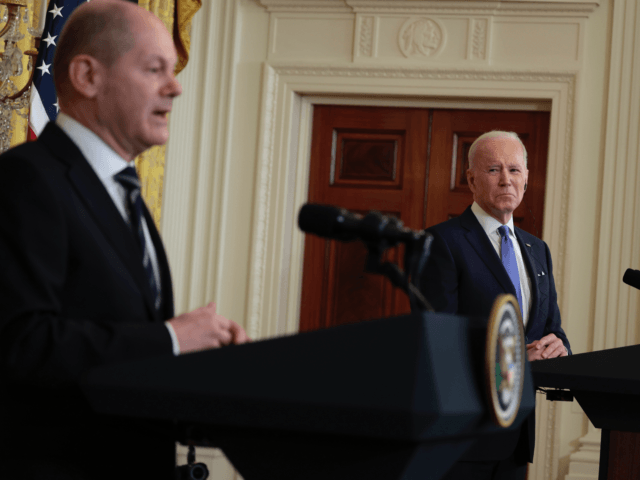German Chancellor Olaf Scholz has shied away from backing President Joe Biden’s pledge to “bring an end” to the Nord Stream 2 pipeline to Europe should Russia invade Ukraine.
In a joint press conference from the White House on Monday, Germany’s recently installed left-wing chancellor, Olaf Scholz refused to confirm his country’s position on the controversial pipeline should Russian forces cross into Ukraine.
Despite lifting sanctions on the pipeline put in place by Donald Trump, President Joe Biden said per a White House readout: “If Germany — if Russia invades — that means tanks or troops crossing the — the border of Ukraine again — then there will be — we — there will be no longer a Nord Stream 2. We will bring an end to it.”
Though American sanctions could hinder the project, the construction is basically complete and opening of the pipeline is ultimately in the hands of Germany, with approval required from the country’s Federal Network Agency (Bundesnetzagentur).
The German chancellor promised to act with “one voice” on the Ukrainian issue with the United States, yet he failed to support the threat to shut down Nord Stream 2.
“It is part of this process that we do not spell out everything in public because Russia could understand that there might be even more to come. And, at the same time, it is very clear we are well prepared with far-reaching measures,” Sholz said according to White House interpreters.
“We will take these measures together with our Allies, with our partners, with the U.S., and we will take all necessary steps. You can be sure that there won’t be any measures in which we have a differing approach. We will act together jointly,” the German leader added.
The approval of the Nord Stream 2 pipeline from Russia is outgoing German Chancellor Angela Merkel’s “biggest mistake”, the former president of the EU Council said in comments backing up warnings from former President Donald Trump. https://t.co/MtjINbgPL8
— Breitbart News (@BreitbartNews) November 30, 2021
Germany, which decided to focus on so-called green energy as opposed to nuclear or fossil fuels under Scholz’s predecessor Angela Merkel, has been facing an energy crisis amid soaring demand following the loosening of lockdown restrictions across Europe and Russia allegedly holding back supplies of natural gas.
Nearly 8 million households in Germany have seen their electricity bills rise by more than 60 per cent over the previous year.
The European power’s reliance on Russian gas has been widely credited for Germany’s reluctance to take a firm line on Ukraine, with Scholz blocking Estonia from sending German-made military equipment to Kyiv. The United States, in comparison, has sent 80 tonnes of “lethal aid” to Ukraine.
In January, former heavyweight boxing champ-turned Kyiv mayor Vitali Klitschko echoed criticisms made by former President Donald Trump against the connections of the German political class with Russian energy firms, particularly former Chancellor Gerhard Schröder, who initially signed off on the construction of the Nord Stream 2 pipeline.
Since leaving office, Schröder has gone on to serve on the boards of several Russian energy companies, including Rosneft, Nord Stream AG, and Nord Stream 2 AG.
Last week, the former chancellor was nominated to serve on the board of Russia’s state-owned gas company, Gazprom, resulting in criticism throughout Germany.
Should the Biden administration follow through with its threats to shut down the Nord Stream 2 pipeline, it remains to be seen where Germany will look to meet its energy demands. The country has already banned the use of fracking for natural gas and is in the process of shutting down its remaining nuclear power plants, after announcing the closure of half of its plants last month.
European Gas Reserves Dwindle, Prices Soaring, Cold Winter Could Mean ‘Gas Disaster’ https://t.co/eyjh3zT5AJ
— Breitbart London (@BreitbartLondon) January 13, 2022
Follow Kurt Zindulka on Twitter here @KurtZindulka

COMMENTS
Please let us know if you're having issues with commenting.